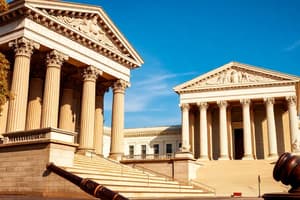Podcast
Questions and Answers
What was the ruling in Cox v. New Hampshire?
What was the ruling in Cox v. New Hampshire?
- Government can regulate the content of speech.
- Speech is completely unregulated.
- Government can place reasonable time, place, and manner restrictions on speech. (correct)
- The case had no significant impact.
What did Gregg v. Georgia reaffirm?
What did Gregg v. Georgia reaffirm?
- The use of the death penalty. (correct)
- The abolition of the death penalty.
- All forms of punishment are cruel and unusual.
- Death penalty does not apply in cases of serious crimes.
What was the primary issue in Reynolds v. United States?
What was the primary issue in Reynolds v. United States?
A Mormon wanted more than one wife but could not use religious duty as a defense.
Regents of the University of California v. Bakke allowed universities to use quotas for admission based on race.
Regents of the University of California v. Bakke allowed universities to use quotas for admission based on race.
What was the outcome of Bethel v. Fraser?
What was the outcome of Bethel v. Fraser?
In Hazelwood v. Kuhlmeier, public school officials control the content of a ________.
In Hazelwood v. Kuhlmeier, public school officials control the content of a ________.
What was the main issue in Morse v. Frederick?
What was the main issue in Morse v. Frederick?
Plyler v. Doe determined that states can deny education to illegal immigrants.
Plyler v. Doe determined that states can deny education to illegal immigrants.
Flashcards are hidden until you start studying
Study Notes
Supreme Court Cases Overview
-
Cox v. New Hampshire: Established that while governments can’t regulate speech content, they can impose reasonable restrictions on time, place, and manner to ensure public safety.
-
Gregg v. Georgia: Confirmed the constitutionality of the death penalty, ending its moratorium and ruling that it is not considered cruel and unusual punishment. This case specifically upheld Troy's death sentence.
-
Reynolds v. United States: Ruled that religious belief does not exempt an individual from criminal prosecution, particularly regarding polygamy. A Mormon's claim of religious duty was inadequate as a defense.
-
Regents of the University of California v. Bakke: Determined that state universities cannot use racial quotas for admissions; less qualified individuals cannot be admitted solely based on race.
-
Bethel v. Fraser: Upheld the right of schools to discipline students for inappropriate speech; a high school student was suspended for giving an inappropriate nominating speech, and the court found this disciplinary action constitutional.
-
Hazelwood v. Kuhlmeier: Affirmed that public school officials have authority over the content of student-sponsored publications, allowing them to regulate what is published in school-sponsored newspapers.
-
Morse v. Frederick: Addressed student free speech by ruling that schools can restrict student expression at school-sponsored events; a student’s suspension for displaying a pro-drug banner was upheld as constitutional.
-
Plyler v. Doe: Ruled that states cannot deny access to public education for children based on their immigration status, protecting the rights of illegal immigrant children to receive education.
Studying That Suits You
Use AI to generate personalized quizzes and flashcards to suit your learning preferences.




